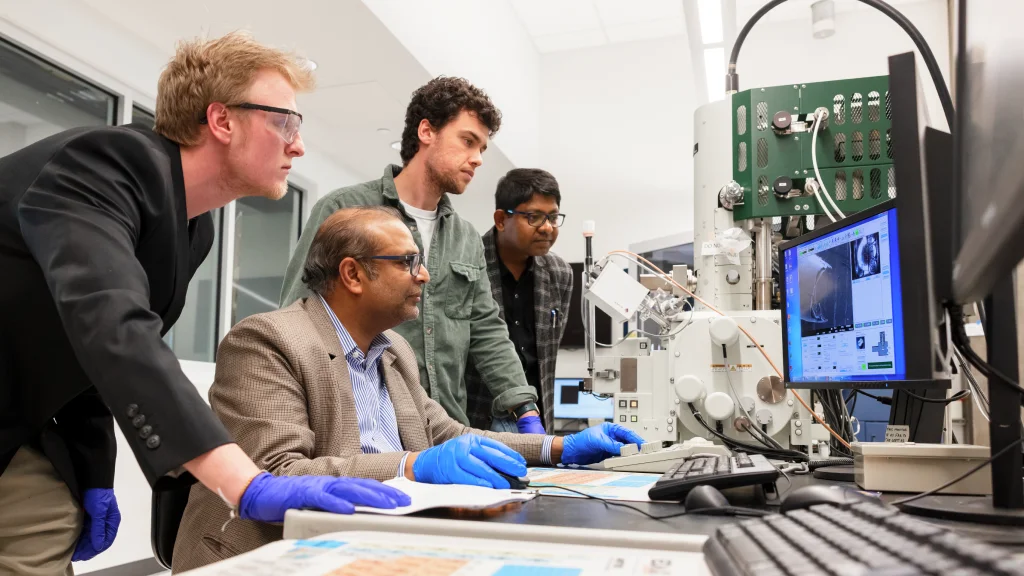Transformative research and creativity

Changing the world through research and creativity
Research, discovery, and creative activity are critical to the vitality and national reputation of our campus. We benefit our students and the State of Indiana by providing innovative solutions to pressing problems as we drive economic development.
Our campus has long been recognized for the significant and transformative impact that community-engaged research and public scholarship can have on the metropolitan Indianapolis region. It is important to maintain this strength even as we build our research profile in other areas.
Success will be measured through increases in research and development expenditures, increased sponsored research support from federal agencies, foundations, industry and government contracts, and increased dissemination of research produced by faculty, undergraduate students, and graduate students.
Goal 1: Increase research productivity by expanding and diversifying high-impact and translational research areas
High-impact research involves areas of focus that equip IU Indianapolis faculty and students with the potential to generate new knowledge, contribute to social well-being, and expand economic development that will improve the lives of individuals and communities in meaningful ways. Supporting the translation of research and creative activity into practical applications and commercial products that can be used in the real world is essential to encouraging innovation and entrepreneurship and driving economic and social growth.
- Multi-disciplinary collaborations. Foster multi-disciplinary collaborations within and across all schools on campus, including the School of Medicine, to engage in high-impact research that will attract large-scale funding.
- Translational research. Expand efforts to translate research and creative activity to the public through a shared commitment to disclosure and licensing of inventions, discoveries and innovations, entrepreneurship and commercialization, and partnerships with key constituencies.
- Culture of positivity. Enhance communication about research and creative activities that engage faculty, staff, students, and the broader community, fostering a culture of positive influence.
- Increase the annual number of externally sponsored faculty-submitted research proposals to 1000.
- Increase the annual number of funded externally sponsored research proposals. It is at $57.1 million as of spring 2023.
- Increase the percentage of tenure-track faculty with external research funding to 50%.
- Grow research funding activities for the IU Indianapolis biosciences engineering institute.
- Increase patent applications and licensing of discoveries to increase revenue annually. In fiscal year 2022, there were 43 applications, six licensing agreements, and $26,173 in licensing income.
- Refine the research strategic communications plan to support the IU Indianapolis transition plan.
Goal 2: Enhance community-engaged research and public scholarship
Enhancing community-engaged research and public scholarship at IU Indianapolis will lead to more equitable and high-impact research by involving communities and the public in the research process, making research findings more accessible and understandable, and promoting public benefit deriving from the research.
- Boosting credibility. Increase recognition of IU Indianapolis as a center for community-engaged research and public scholarship to enhance the reputation of the campus and university.
- Engaging with the community. Develop internal capacity for community-engaged research and public scholarship to address the community’s needs and priorities.
- Sharing academic knowledge. Promote research and scholarly dissemination through high-quality peer-reviewed outlets.
- Receive Carnegie Elective Classification for Community Engagement in 2026.
- Double the number of dossiers annually reviewed by the Public and Engaged Scholarship Review Committee.
- Increase the number of tenure-track faculty conducting community-engaged research with external research funding, with a baseline established by 2024.
- Increase the number of faculty promotions based on community-engaged research and public scholarship to 6%.
- Increase the number of books published to the top 50% of the peer group.
- Increase the number of peer-reviewed published articles to place IU Indianapolis in the top 50th percentile.
- Increase the citation count to the top 50% of the peer group.
Goal 3: Enhance support for faculty excellence in research
By supporting faculty excellence in research, IU Indianapolis can help to advance knowledge, improve education, enhance competitiveness, and drive economic growth.
- Pathways to success. Create clear and achievable pathways for success for early career faculty through strategic hiring of high-quality faculty who are supported by structured developmental mentoring, equitable access to resources to support funding success pre- and post-award, and protected time.
- Faculty retention. Enhance retention efforts for mid-to-late career faculty, ensuring there are multiple ways of defining and articulating scholarly impact and that research funding is more flexible and easier to secure and manage. Lead peer institutions in terms of mental health, wellness, and adaptive educational experiences to help ensure students are better equipped to manage the demands of academic life.
- Reduce faculty turnover for early-career tenure-track and non-tenure-track faculty. The current attrition rate is 12.5%.
- Increase levels of job satisfaction by IU Indianapolis faculty as reported through the Collaborative on Academic Careers in Higher Ed (COACHE) Faculty Job Satisfaction survey.
IU Indianapolis
Office of the Chancellor
University Hall, Suite 5010
301 University Blvd
Indianapolis,
IN
46202
USA